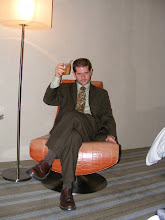The Economy of Rocky III

4/14/06
I'm terrified.
We've become fat, lazy and complacent. Worse than that, seeing no evidence to the contrary, we've become convinced that we're entitled to an easy life. We want less, easier work for better pay that keeps us in the manner to which we've become accustomed. Gen X and Gen Y are so used to treating "wants" as "needs" that we can't imagine a world without the almost instant gratification of being able to purchase luxuries. Hell, I dunno what I'd do without cable TV. I've become used to thinking of it as a necessity and to go without it now, well, you might as well ask me if I wouldn't mind sleeping in the refrigerator from now on, as we need the bedroom for aggressive weasel farming. (Wow; that was really strange.)
We're going into tech and business jobs, which is good, but we're only innovating the way things function instead of the actual products themselves. Science and Engineering degrees are dropping precipitously among Americans. In the 1990s the number of foreign-born Ph.D.s in Science and Engineering went from 24% to a whopping 38%, meaning a drop of 14% among native-born Americans going for the same degrees. Before the millennium this wouldn't have been troubling, as those foreigners who had earned a degree over here usually stayed over here, for lack of any comparable job in their own countries. We've managed to stay ahead of the game and afloat thus far because so many S&E jobs have been coming into the US from outside. But with outsourcing and the leveling of the global economy by way of technology and the internet, those same graduates can now go back home to China or Russia or India and do the same work previously only found in the US, leading innovation there instead of over here.
Just up to, including, and after World War II the United States led the world hands-down in innovation and production of just about anything you could imagine. It didn't hurt us that nearly every other country was bankrupt from the prolonged global skirmish, either. We basically had a free ticket to coast for the next forty years while the rest of the world played catch-up. And boy, have they ever. It's what I like to call, The Rocky Syndrome.
 What? I like the name. Shut-up; next time you come up with an overly simple, pop-culture analogy to explain something as complex as geopolitical economics you name the thing.
What? I like the name. Shut-up; next time you come up with an overly simple, pop-culture analogy to explain something as complex as geopolitical economics you name the thing. In Rocky I and II, Rocky was a poor underdog with little going for him other than his sheer fire and hunger to be the best against the admittedly better technical fighter, Apollo Creed. (Rocky = USA prior to mid 1800s, Creed = Europe) But through grit, determination and a stupefying optimism Rocky prevailed and became the best fighter in the world. (USA Superpower, circa 1940-current) But what happened in Rocky III? Our hero, grown happy and complacent in the #1 role thought that he could rest back on his laurels (whats a laurel?) and not continue to push himself to innovate, convinced his good fortune would just roll on forever since historically it had been in a nice little uptrend. Then Clubber Lang (Mr. T, fool!) comes along and just beats the holy bejesus out of Rocky because now Clubber is the up-and-coming fighter, hungrier and more eager to gain his ground than Rocky was to keep it.
 (Clubber = China, India, and Russia very, very soon) Clubber knew that he didn't have the advantages that Rocky did, and the only way he was going to reach and surpass Rocky's level was to work harder, longer, better, and just plain want it more.
(Clubber = China, India, and Russia very, very soon) Clubber knew that he didn't have the advantages that Rocky did, and the only way he was going to reach and surpass Rocky's level was to work harder, longer, better, and just plain want it more.By the time we find ourselves with our chins on the canvas, knocked for a loop by the staggeringly huge population of Chinese, Indian and Russian workers who are better educated, more eager, and just plain harder workers than we are, it might be too late for us to come back at the end of the movie for that kick-ass forty-five minute final fight where Rocky takes back the title and we all cheer as if there's been a serious white heavyweight champion in the past sixty years. The US might be so terminally buried by our own complacent blindness that we'll have to play catch-up for decades and may never regain our position as premiere producers in the world. I really don't want to say to my kids, "Someday, maybe if were very lucky, we can live as well as they do over in India."
I don't want my kids to do worse than me. Lord knows it's no picnic as it is.


0 Comments:
Post a Comment
<< Home